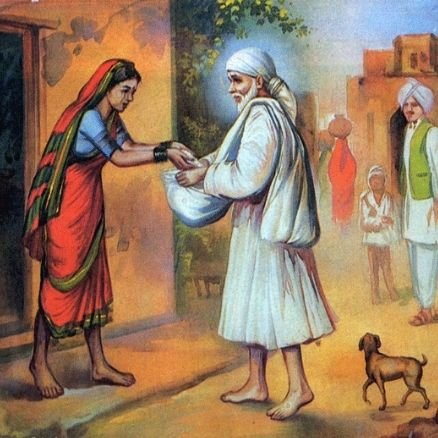Sree Ram Navami
Sree Ram Navami, the auspicious birthday of Lord Sri Rama, is celebrated with immense devotion and grandeur at the Athal Thottam Shirdi Saibaba Temple...
Read MoreAmong the teachings of Sai Baba of Shirdi there are the cardinal principles of Sai Path called 'Shraddha' and 'Saburi'. Sai Baba looks for these two qualities in his devotees.Here are the teachings and philosophies of Sai Baba of Shirdi.
Shraddha : 'Shraddha' is a Sanskrit word, which roughly means faith with love and reverence. Such faith or trust is generated out of conviction, which may not be the result of any rational belief or intellectual wisdom, but a spiritual inspiration. According to Sai Baba of Shirdi, steadfast love in God is the gateway to eternity. Baba's teaching, both direct and indirect explicate the significance of 'Shraddha'. Baba reiterates the spiritual guidance of Shri Krishna to Arjun - "Whosoever offer to Me with love or devotion, a leaf, a flower, a fruit or water, that offering of pure love is readily accepted by Me".
Saburi : 'Saburi'; means patience and perseverance. Saburi is a quality needed throughout the path to reach the goal. This quality must be ingrained in a seeker from day one, least he looses his stride and leaves the path half way
Purity : For Sai Baba it was not the purity of the body but inner purity that mattered. No amount of physical and external cleansing would serve any purpose if the man remained impure in mind and heart. Therefore, Baba cautioned His devotees not to make austerity as an end itself, lest they should indulge in physical mortification.
Compassion : Himself an epitome of compassion and love, Sai Baba taught compassion among his disciples. Baba often told His devotees, 'Never turn away anybody from your door, be it a human being or animal'.
Complete Surrender to the Guru : Sai Baba put Guru on a high pedestal of reverence. For Him Guru was the profound base of the path of devotion. Pointing to his physical frame, "This body is my house. I am not here. My Guru (Master) has taken me away". He asked for complete surrender to the 'Guru'.
Sai Baba's Teachings through 'Udi' : Udi or the sacred ash was produced from the perpetual fire called 'dhuni' lit by Sai Baba in Dwarkamai at Shirdi. Explaining the meaning of life He would refer to Udi and taught that like Udi all the visible phenomena in the world are transient. Through this example Sai Baba wished to make his devotees understand the sense of discrimination between the unreal and the real. Udi taught the devotees discrimination or vivek or Vairagya.

Tortoise is regarded as one of the God incarnations in Hindu religious philosophy.According to Hindu mythology, it is a tortoise which bears the weight of the world on its back.
Praying to Almighty via Nandi makes devotees believe that their problems will surely end soon.Nandi as an idol as he unconditionally loves the Lord and surrenders himself completely.
Charan paduka brings success in every aspect of your life.It's beileved that bowing before charan paduka is surroundering ourselves to him.
Eleven Assurances
1. Whosoever puts their feet on Shirdi soil, their sufferings will come to an end.
Eleven Assurances
2. The wretched and miserable will rise to joy and happiness as soon as they climb the steps of the mosque.
Eleven Assurances
3. I shall be ever active and vigorous even after leaving this earthly body.
Eleven Assurances
4. My tomb shall bless and speak to the needs of my devotees.
Eleven Assurances
5. I shall be active and vigorous even from my tomb.
Eleven Assurances
6. My mortal remains will speak from my tomb.
Eleven Assurances
7. I am ever living to help and guide all who come to me, who surrender to me and who seek refuge in me.
Eleven Assurances
8. If you look to me, I look to you.
Eleven Assurances
9. If you cast your burden on me, I shall surely bear it.
Eleven Assurances
10. If you seek my advice and help, it shall be given to you at once.
Eleven Assurances
11. There shall be no want in the house of my devotee.
At Athal Thottam Shirdi Saibaba Temple, We humbly wish to share that our temple does not actively seek donations. However, some devotees, out of deep faith and devotion, choose to make offerings to Baba. Such heartfelt gestures of love and surrender cannot be disregarded.
In such cases, we gratefully accept these offerings and ensure that they are used only for the temple’s daily poojas, rituals, and essential needs, in service of Baba and the devotees who visit.
With Baba’s grace, every contribution is treated with utmost respect and sincerity, supporting the smooth functioning of the temple and the continuation of spiritual activities.


Upcoming Event
🏹 Ram Navami Special Bhajans 🌸, We warmly invite you 🙏.
Major Festivals Celebrated In Athal Thottam Shridi Saibaba Temple.